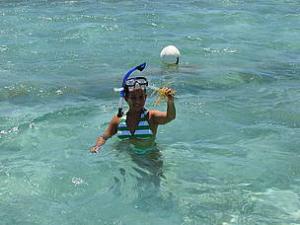Belize Barrier Reef removed from in danger list
Belizeans and environmentalists worldwide are celebrating the removal of the Belize Barrier Reef, one of the world’s most diverse ecosystems, from UNESCO’s List of World Heritage in Danger at a World Heritage Committee meeting in Bahrain on June 26.

La bióloga de WWF, Shalini Cawich, muestra un alga comestible que podría ser una alternativa de ingresos para los pescadores del área de Turneffe.
The Belize Barrier Reef Reserve System World Heritage site had been inscribed on the In Danger list for almost a decade due to the threat of irreversible damage from harmful coastal construction and oil exploration, as well as the absence of a solid regulatory framework. Seismic testing for oil was permitted just 10 kilometres from the site as recently as October 2016, leading to a public outcry from Belizeans organised by a coalition of local civil society, including WWF, Oceana, Belize Tourism Industry Association, Belize Audubon Society and Belize Institute for Environmental Law and Policy. Local efforts were supported by an international campaign led by WWF.
Belize’s government has over the last eighteen months put in place the necessary protections to secure the Belize Barrier Reef Reserve System World Heritage site from immediate threats. A landmark moratorium on oil exploration in Belizean waters was adopted in December 2017, making Belize one of only three countries in the world with such legislation2. In June 2018, the government of Belize enacted critical regulations to protect the country's mangroves and committed to legislate the current voluntary moratorium on selling the public lands within the World Heritage site.
Marco Lambertini, Director General of WWF-International, said:
“WWF welcomes the removal of the Belize Barrier Reef from the UNESCO List of World Heritage in Danger. At a time when we are seeing numerous threats to World Heritage sites, Belize’s government has taken real action to protect one of the world’s most special places.
“We have seen an incredible turnaround from when the reef was being threatened by seismic testing for oil just eighteen months ago. Belizeans stood up to protect their reef, with hundreds of thousands more globally joining the campaign to save our shared heritage. In taking swift collaborative action, Belize has shown that it is possible to reverse nature loss and create a sustainable future.”
As the main part of the Mesoamerican Reef, the world’s second largest barrier reef system, the Belize Barrier Reef has been recognised as a World Heritage site since 1996. Home to hundreds of species, the reef is also an important economic resource for Belize with approximately 190,000 people supported by incomes generated through reef-related tourism and fisheries.
Nadia Bood, Mesoamerican Marine Scientist at WWF in Belize, said on June 26:
“Today is a proud day for Belize. Our reef supports both an incredible diversity of wildlife and the livelihoods of more than half our population. By enacting the necessary protections for the reef, including a landmark oil moratorium last year, Belize’s government has recognised the need to protect the nature on which its people depend.”
The formal decision by the World Heritage Committee to remove the Belize Barrier Reef from the In Danger list announces Belize’s transition to global leader in marine conservation. However, just as important is how Belize achieved the delisting: it was able to take the decisive action necessary to protect the reef by working with, and consulting, all stakeholders, including IUCN, UNESCO and civil society.
Fanny Douvere, Coordinator of the Marine Programme at the World Heritage Centre at UNESCO, said:
“The removal of the Belize World Heritage Site from the in danger list is the result of Belize putting in place the necessary protections for the Belize Barrier Reef. Working together with international organisations and civil society, it was able to identify and take the actions needed to secure this incredible site from immediate threats, and create a collaborative model that others can follow.”
WWF encourages others to follow the compelling example of collaborative action set by Belize.
Lambertini commented:
“The journey of Belize’s removal from the in danger list shows that when governments, international institutions and civil society work together, it is possible to avoid harmful activities that threaten our planet’s unique places in favour of sustainable alternatives that will secure a prosperous future for all.”
Source: World Wildlife Fund
- 307 reads
Human Rights
Fostering a More Humane World: The 28th Eurasian Economic Summi

Conscience, Hope, and Action: Keys to Global Peace and Sustainability

Ringing FOWPAL’s Peace Bell for the World:Nobel Peace Prize Laureates’ Visions and Actions

Protecting the World’s Cultural Diversity for a Sustainable Future

Puppet Show I International Friendship Day 2020

